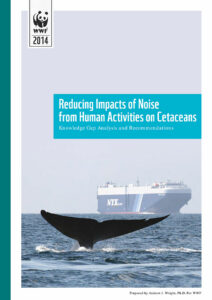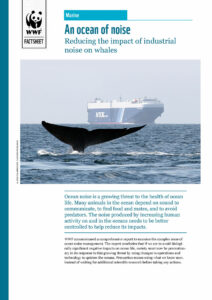© VDOS Global / WWF-Canada
Features
Whales & ocean noise
- Beluga
- Bowhead whale
- Narwhal
- Oil and gas
- Pan-Arctic
- Shipping
Whales depend on their hearing to locate food, raise calves, and find mates.
But undersea noise pollution – from oil and gas exploration, ships, and other industrial sources – makes it difficult for whales to find each other. It can even damage their hearing.
Download
REDUCING IMPACTS OF NOISE FROM HUMAN ACTIVITIES ON CETACEANS (PDF, 4 MB)
FACTSHEET: REDUCING THE IMPACT OF INDUSTRIAL NOISE ON WHALES (PDF, 3 MB)
Listen to ocean sounds
Large ship traffic, offshore oil exploration and development, and military exercises are all contributing to a barrage of noise buffeting ocean life. This cacophony is hard on whales that use sound for essential communication – especially in previously quiet oceans, such as the Arctic.
Try mixing industrial and whale sounds below, to hear the soundscape for yourself.
Sounds provided by the Scripps Whale Acoustics Laboratory, UCSD
Industrial sounds
Floating oil platform thrusters
Stationary oil platform
Seafloor oil processing (steady)
Natural sounds
Beluga whistles
Bowhead song
Gray whale
Solutions
Reduce
Reduce ocean noise at its source (ships, industrial equipment)
Research
Support research on technologies to reduce noise created by oil exploration, commercial shipping, and pile driving
Create quiet zones
Make parts of the ocean important for whales off limits to big noise producing activities, especially during sensitive times (such as calving).
By WWF Global Arctic Programme

